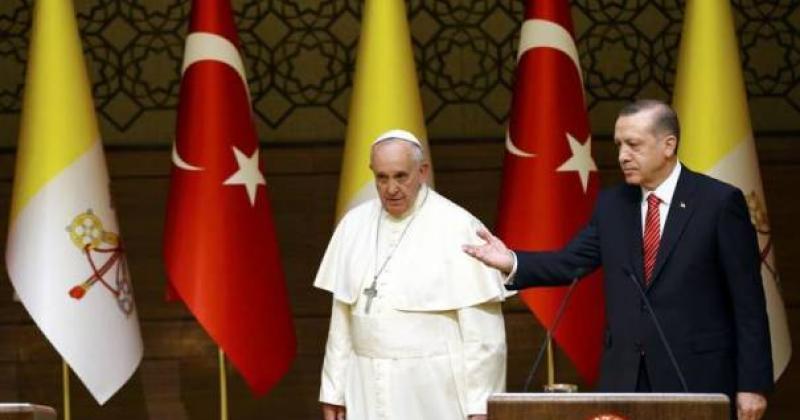In his address to Turkey’s political leaders, Francis recalled the role and responsibility the country has in maintaining peace in the region and called for equal rights and duties for the country’s religious minorities. “We’re on the same page when it comes to the fight against terrorism,” Erdoğan stated.
“Fanaticism and fundamentalism, as well as irrational fears which foster misunderstanding and discrimination, need to be countered by the solidarity of all believers.” When the moment came to address Turkey’s political leaders in Ankara’s imposing presidential complex which cost more than 600 million dollars, Pope Francis had already paid homage to Atatürk’s Mausoleum and met the Turkish President Recep Tayyip Erdoğan.
Francis’ is the first State visit to the monumental new palace built on a hill overlooking the city. Inside the grand wood panelled hall adorned with the Turkish and Vatican flags, inaugurated especially for the occasion, the pilgrim Pope stands in front of the podium where the microphones are, listening to Erdoğan speak: “The message we give today will help the difficult situation we find ourselves in.” The President said he agreed with the Pope on “terrorism, violence in the world” and with his stand against the “supremacy of capital”. Erdoğan said Islamophobia is growing in the West and some want to make Islam synonymous with violence. He denounced groups such as Boko Haram and ISIS but also attacked Syria’s “State terrorism”, which has led to 300 thousand civilian deaths. Standing before the Pope, his head bowed, he launched a direct attack on Assad “the tyrant”, criticising the silence of the international community.
When Francis took the floor, he defined Turkey as a “natural bridge between two continents and diverse cultures”. He recalled that it is “the birthplace of Saint Paul”, “it is also renowned for the site near Ephesus which a venerable tradition holds to be the “Home of Mary”” and for “hosting the first seven Councils of the Church.” But we must focus on today. On the current situation of a country, which has, ISIS’s terrorists on its doorstep, whilst searching for its own domestic equilibrium in light of the restrictions placed on the freedom of expression. “There is a need to move forward patiently in the task of building a lasting peace, one founded on respect for the fundamental rights and duties rooted in the dignity of each person,” Francis said. “To this end, it is essential that all citizens – Muslim, Jewish and Christian – both in the provision and practice of the law, enjoy the same rights and respect the same duties.”
Religious freedom and freedom of expression, the pope continued, “will help friendship to flourish and thus become an eloquent sign of peace.” Something the Middle East, Europe and the world have waited for a long time. “The Middle East, in particular, has for too long been a theatre of fratricidal wars, one born of the other, as if the only possible response to war and violence must be new wars and further acts of violence.”
“How much longer must the Middle East suffer the consequences of this lack of peace? We must not resign ourselves to ongoing conflicts as if the situation can never change for the better! With the help of God, we can and we must renew the courage of peace! Such courage will lead to a just, patient and determined use of all available means of negotiation, and in this way achieve the concrete goals of peace and sustainable development.”
Francis recalled that “in Syria and Iraq, particularly, terrorist violence shows no signs of abating. Prisoners and entire ethnic populations are experiencing the violation of the most basic humanitarian laws. Grave persecutions have taken place in the past and still continue today to the detriment of minorities, especially – though not only – Christians and Yazidis. Hundreds of thousands of persons have been forced to abandon their homes and countries in order to survive and remain faithful to their religious beliefs.”
The Pope recognised that in Turkey, “which has generously welcomed a great number of refugees, is directly affected by this tragic situation on its borders; the international community has the moral obligation to assist Turkey in taking care of these refugees.” Francis also reiterated that “we cannot remain indifferent to the causes of these tragedies. In reaffirming that it is licit, while always respecting international law, to stop an unjust aggressor, I wish to reiterate, moreover, that the problem cannot be resolved solely through a military response.” As has been tragically proven by the many wars that have broken out in the region over the years, a military solution would only lead to more violence.
“What is required is a concerted commitment on the part of all, based on mutual trust, which can pave the way to lasting peace, and enable resources to be directed, not to weaponry, but to the other noble battles worthy of man: the fight against hunger and sickness, the promotion of sustainable development and the protection of creation, and the relief of the many forms of poverty and marginalization of which there is no shortage in the world today,” Francis concluded. And Turkey, by virtue of its history, geographical position and regional influence, has a great responsibility: the choices which Turkey makes and its example are especially significant and can be of considerable help in promoting an encounter of civilizations and in identifying viable paths of peace and authentic progress.”
